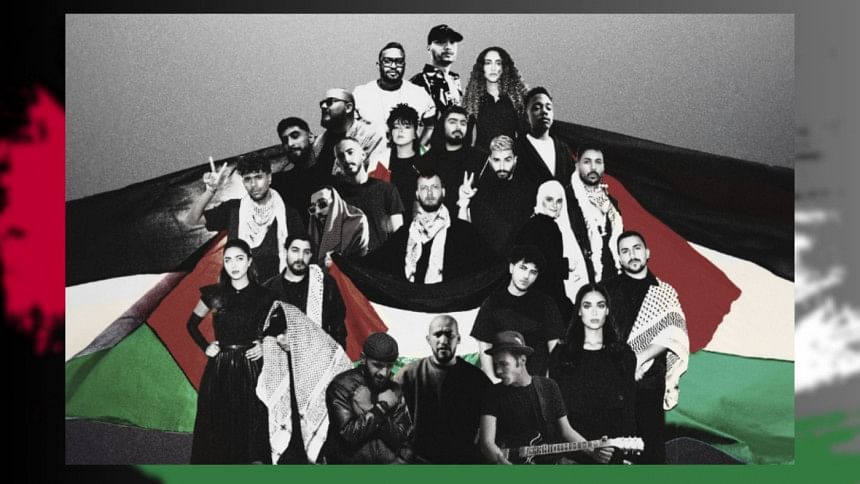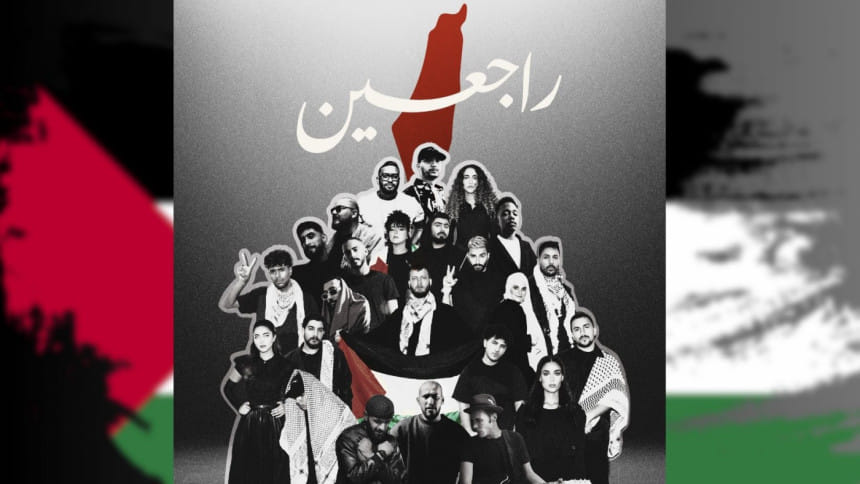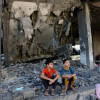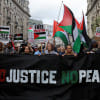Wana-Mena artistes unite for powerful ode to Palestinian resistance

One month into Israel's brutal attack on Gaza, 25 artistes from the West Asia and North Africa (Wana) and Middle East and North Africa (Mena) region joined forces to create "Rajieen" – a direct response against the occupation's attacks. Translated as "We will return" or simply "Returning", this eight-minute track was composed and performed as an act of solidarity. It serves as an anthem that transcends borders, paying tribute to the strength and resilience of the Palestinian people and their history while resoundingly calling for justice.

"Rajieen" features some of the brightest stars in the Arab world of music, spanning different genres across 11 countries, including artistes hailing from Palestine. Contributors to this piece include Saif Safadi, Dana Salah, Ghaliaa Chaker, Afroto, Nordo, Saif Shroof, A5rass, Issam AlNajjar, Balti, Amir Eid, Wessam Qutub, Dina El Wedidi, Saif Bataineh, Omar Rammal, Al Yung, Randar, Vortex, Small X, ALA, Fuad Gritli, Donia Wael, Zeyne, Marwan Moussa, Marwan Pablo, and Dafencii. The track was produced by Jordanian producer and multi-instrumentalist Nasir Albashir, with co-production by Egyptian singer-songwriter Marwan Moussa and Palestinian multidisciplinary artiste Amr Shomali.
In addition to Albashir, a team of creatives from the region envisioned and organised this project. The team includes Palestinian-Jordanian writer and actor Hayat Abu Samra, Jordanian creative director Farah Hourani, Ego and East Talent Management Co-Founder Reem Kanj, Beirut Records and International Artist Manager Founder Hiba Abou Haidar, Libyan director Ahmad Kwifiya, and Palestinian filmmaker Omar Rammal.
While some artistes gathered at Levant Studios in Amman to film the video, others had to record remotely. This collaborative effort emerged in support of Palestine.
What does Rajieen entail?
Donned in the signature black and white checkered Keffiyeh–the Palestinian scarf that has become a symbol of resistance– the artistes appear in the music video. Each verse of the track tells the tale of the Palestinian struggle against the Israeli occupation. The music video opens with a haunting intro, showcasing the devastated state of Gaza as an artiste mournfully asks, "Have we forgotten that I am in my land, and this is my country? And in my country, I'm imprisoned?"
Each artiste then delivers concise verses, referencing current events and historical anecdotes woven into each line. Syrian artiste Ghaliaa Chaker sings, "All we asked for was the freedom to live. But all we got in return was murder and displacement," referencing the Palestinian plight over the past 75 years.
Egyptian artist Afroto asks, "What crime did the murdered child commit?" as the death toll of children rises every day. Jordanian artiste Shroof laments how despite the death and destruction in Gaza, the massacre is still not stopping. Moroccan rapper SmallX later points out that those who speak up are being silenced.
Palestinian-Jordanian artist Issam AlNajjar then states in a powerful chorus, "The key to my home remains in my heart. And I'm returning with my children in my hands," asserting that the key to the homes that Palestinians lost since the displacement (the Nakba) in 1948 still resides in their hearts. This key is both symbolic and literal, as many Palestinians still hold on to the keys to the homes that they have lost. AlNajjar continues, "Even if the whole world stands against me, I am returning, O my country, I am returning!"
Tunisian artiste Balti questions the silence of Arab leaders, asking why they are silent. Palestinian filmmaker Omar Rammal points out the hypocrisy and racial bias evident in the media, sardonically stating, "Sorry that I'm not from Ukraine. Sorry that my skin is not white. Sorry to my children. Sorry that I brought you into a hypocritical and unjust world."
The historical references that the artistes sing about span both the past and the present, including the bombing of the Al-Ahli Baptist Hospital in Gaza in October of last year and the Balfour Declaration of 1917 that initiated the occupation of Palestine, amongst others. The artistes condemn the occupation and its enablers, criticising the cowardice of Western media and promising that they will fight back for the freedom of Palestine and its people, and their right to return. The song ends with a powerful call to the people of the world, led by Egyptian artist Dina El Wedidi, repeating, "Should I lose my voice, yours shall remain." Coupled with footage of protests in solidarity with Palestine worldwide, this track is indeed a call for justice for the people of the world. This sounds especially haunting as over 100 journalists who had been reporting from Gaza were killed.
With a blend of Arabic backbeats, soulful elements, rap, and hip hop, "Rajieen" showcases actual footage from Gaza and historical evidence of the Palestinian struggle. Resembling famous tracks such as "We are the World", "We Shall Overcome", "The Arab Dream", etc, this powerful track can be listed amongst songs that call for the freedom of the oppressed.
Since its release, the music has garnered over 3.1 million views and has subtitles in five languages, including English. All revenue generated by the track will be donated to the Palestine Children's Relief Fund (PCRF). The music video has both an uncensored version, showcasing the brutality of the attack on Gaza, and a censored version.
At the time of writing this article, at least 23,357 people have been killed and more than 59,410 wounded in Israeli attacks on Gaza since October 7. The bombings have yet to stop. Thus, "Rajieen", an anthem of both hope and resilience and an act of solidarity, asserts, "We do not just stand in solidarity with the cause; we are its custodians."

 For all latest news, follow The Daily Star's Google News channel.
For all latest news, follow The Daily Star's Google News channel. 










Comments